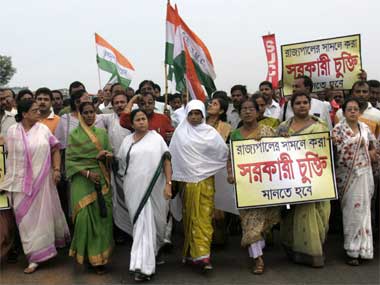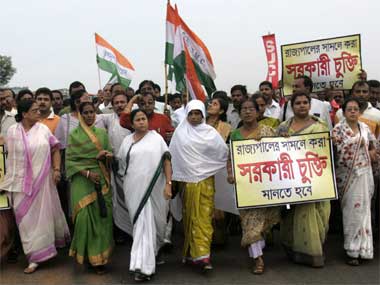By Amulya Ganguli The shadowy figures of the Maoists are looming in the background of West Bengal elections, but in a manner that is more intriguing than threatening. For a start, they have generally refrained from undertaking violent operations. In a way, this is true of the national scene as well where there haven’t been repeated incidents of ambush as before which claimed the lives of scores of security personnel. If anything, the relative quiet suggests that Maoist terrorism may be losing its sting. But that is another story. [caption id=“attachment_9081” align=“alignleft” width=“380” caption=“Does Mamata still need the Maoist support, or have the tables turned? Jayanta Shaw / Reuters”]
 [/caption] Where West Bengal is concerned, it is significant that the Maoists haven’t given any call for a poll boycott to assert their avowed disdain for parliamentary politics. But to say, as the Marxists might, that this unexplained silence confirms the Maoists’ subterranean ties with Mamata Banerjee would be to jump to conclusions. That such ties exist are undeniable. But these have been in keeping with the age-old tactic of an enemy of an enemy being a friend rather than any formal relationship. In any event, such contacts could not be overt since the Maoists, after all, belong to an underground, seditious organisation. So, the ties amounted to the helping hand which the Maoists extended to Mamata from behind the scenes by being a part of the agitators who rallied to her call in Singur, Nandigram, Lalgarh and elsewhere. On their part, too, they just want to harass their old blood relations, the Marxists, rather than be of assistance to a bourgeois politician. Now that Mamata no longer needs the Maoists, the relevance of those ties are even more uncertain. At the same time, the Maoist presence in the countryside should not be overestimated. Their exact strength in terms of cadres or influence among the ordinary people is unknown. In fact, much of their purported sway is the result of the mysterious aura which they like to create about themselves if only to give an inflated impression of their clout. What is more, the recent police actions and arrests must have weakened them. From the point of view of the poll scene they have not been much of a factor. This lack of significance helps Mamata. For one, it tells the voters that the Marxist allegations of a Mamata-Maoist entente cordiale are untrue. For another, Mamata is able to dispense with her old baggage of being sympathetic to the Maoists. She’d called for the withdrawal of paramilitary forces from the Maoist-infested areas, ascribed many of the Maoist acts of violence to the Marxists and said that Kolkata would burn if the writer, Mahashweta Devi, a Maoist sympathizer, is arrested. However, much of this overblown rhetoric did reflect ground realities. After all, the presence of the paramilitary does terrorize the ordinary villagers and, at the ground level, there is little to distinguish between Maoist and Marxist depredations, as the latter’s gunning down of innocent people in Netai village showed. But, now that a large number of people look upon her as chief minister in waiting, it is just as well that the quiescence of the Maoists enables her to focus more on her main adversary rather than on the latter’s other foe. For the Maoists themselves, if they are at all in a position which is secure enough to assess their role in the next weeks and months, what Mamata’s latest neutral stance indicates is that there will be little change in Writers Building’s policies. As chief minister and an ally of the centre, Mamata is unlikely to be an adventurer. She may formally hold out an olive branch, but if the Maoists indulge in any acts of violence, it is Chidambaram’s line that will prevail irrespective of who is in charge. Since Mamata will have to cope with the suppressed or not-so-suppressed rage of the comrades if she wins, she will also be wary of letting the Maoists fish in troubled waters. An awareness that her present momentum will dissipate unless there are signs of an economic revival within the first few months of her reign is bound to make her endorse the centre’s hardline stance towards the Maoists since a stable law and order situation is a must for industrial growth. For the Maoists, therefore, the coming period will be the moment of truth. They will not be able to derive any satisfaction either from the victory of a closet friend or the defeat of an inveterate enemy. They will also realize that any gains which they may have made in the recent past were the result of the Left Front’s many failures from which all its other opponents also benefitted, whether it was the Trinamool Congress or the Congress or the Socialist Unity Centre. It had little to do with Maoism or West Bengal’s fabled intellectual partiality towards the Left. Just as the Naxalites have faded away in Naxalbari – Kanu Sanyal having committed suicide and Jangal Santhal died of excessive drinking – the Maoists, too, will contribute no more than a few chapters towards the end of their story of a failed revolution. The writer is a Delhi-based political commentator.
[/caption] Where West Bengal is concerned, it is significant that the Maoists haven’t given any call for a poll boycott to assert their avowed disdain for parliamentary politics. But to say, as the Marxists might, that this unexplained silence confirms the Maoists’ subterranean ties with Mamata Banerjee would be to jump to conclusions. That such ties exist are undeniable. But these have been in keeping with the age-old tactic of an enemy of an enemy being a friend rather than any formal relationship. In any event, such contacts could not be overt since the Maoists, after all, belong to an underground, seditious organisation. So, the ties amounted to the helping hand which the Maoists extended to Mamata from behind the scenes by being a part of the agitators who rallied to her call in Singur, Nandigram, Lalgarh and elsewhere. On their part, too, they just want to harass their old blood relations, the Marxists, rather than be of assistance to a bourgeois politician. Now that Mamata no longer needs the Maoists, the relevance of those ties are even more uncertain. At the same time, the Maoist presence in the countryside should not be overestimated. Their exact strength in terms of cadres or influence among the ordinary people is unknown. In fact, much of their purported sway is the result of the mysterious aura which they like to create about themselves if only to give an inflated impression of their clout. What is more, the recent police actions and arrests must have weakened them. From the point of view of the poll scene they have not been much of a factor. This lack of significance helps Mamata. For one, it tells the voters that the Marxist allegations of a Mamata-Maoist entente cordiale are untrue. For another, Mamata is able to dispense with her old baggage of being sympathetic to the Maoists. She’d called for the withdrawal of paramilitary forces from the Maoist-infested areas, ascribed many of the Maoist acts of violence to the Marxists and said that Kolkata would burn if the writer, Mahashweta Devi, a Maoist sympathizer, is arrested. However, much of this overblown rhetoric did reflect ground realities. After all, the presence of the paramilitary does terrorize the ordinary villagers and, at the ground level, there is little to distinguish between Maoist and Marxist depredations, as the latter’s gunning down of innocent people in Netai village showed. But, now that a large number of people look upon her as chief minister in waiting, it is just as well that the quiescence of the Maoists enables her to focus more on her main adversary rather than on the latter’s other foe. For the Maoists themselves, if they are at all in a position which is secure enough to assess their role in the next weeks and months, what Mamata’s latest neutral stance indicates is that there will be little change in Writers Building’s policies. As chief minister and an ally of the centre, Mamata is unlikely to be an adventurer. She may formally hold out an olive branch, but if the Maoists indulge in any acts of violence, it is Chidambaram’s line that will prevail irrespective of who is in charge. Since Mamata will have to cope with the suppressed or not-so-suppressed rage of the comrades if she wins, she will also be wary of letting the Maoists fish in troubled waters. An awareness that her present momentum will dissipate unless there are signs of an economic revival within the first few months of her reign is bound to make her endorse the centre’s hardline stance towards the Maoists since a stable law and order situation is a must for industrial growth. For the Maoists, therefore, the coming period will be the moment of truth. They will not be able to derive any satisfaction either from the victory of a closet friend or the defeat of an inveterate enemy. They will also realize that any gains which they may have made in the recent past were the result of the Left Front’s many failures from which all its other opponents also benefitted, whether it was the Trinamool Congress or the Congress or the Socialist Unity Centre. It had little to do with Maoism or West Bengal’s fabled intellectual partiality towards the Left. Just as the Naxalites have faded away in Naxalbari – Kanu Sanyal having committed suicide and Jangal Santhal died of excessive drinking – the Maoists, too, will contribute no more than a few chapters towards the end of their story of a failed revolution. The writer is a Delhi-based political commentator.
Is Mamata the moment of truth for Bengal's Maoists?
FP Archives
• May 13, 2011, 09:13:25 IST
Mamata Banerjee has been called the Maoists’ friend by the Left Front. But as chief minister does she need the Maoists any longer or do they need her?
Advertisement
)